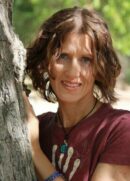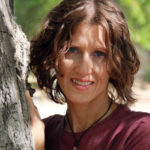Paw it forward

Colleen Dougherty
I don’t know who saw them first, Trinket or me. All I know is I couldn’t believe my eyes.
It was about 7 a.m. on the Saturday before Mother’s Day, and we were looking out the front window at the first light of morning. All at once I spotted them — a mother duck and 10 tiny ducklings toddling down the sidewalk across the street! A duck! What on earth were a mama duck and ducklings doing on a city street in Albuquerque? Yet there they were, together, and it was adorable.
Two days earlier, I’d watched a new documentary from the PBS program, Nature, called, “Grizzly 399: Queen of the Tetons.” 399, as she’s affectionately known (that’s her National Park Service number), is a unique and, as renowned nature photographer, Thomas Mangelsen, says, “a very special bear.”
Every spring for the past 15 years, Mangelsen has photographed the female grizzly as she raises her family of cubs. Sometimes she’s raising one cub, sometimes two or three and, in 2020, she surprised everyone with four cubs!
Several things make Grizzly 399 unique: for one, she’s just turned 26, which is near the end of the life span for a bear in the wild, and especially late in life to continue having cubs.
Her true fame has evolved from another aspect of her uniqueness: Grizzly 399 raises her cubs in the open, in plain sight, alongside the main road running through the park. This is not likely an arbitrary choice because 399 knows some things about her male counterparts in the wild, things biologists also know. For one, a female grizzly won’t mate if she’s raising cubs. So if a male wants to mate with her, he has to kill the cubs. This pushes the female into heat and she’ll then mate (yes, with the bear that just killed her children. Spooky.)
Also, male grizzlies do not like people or traffic. So, 399’s choice of real estate keeps the males away and keeps her cubs safe. Brilliant, except for one thing: her presence near humans, accelerated by her fame, has resulted in she and her cubs becoming habituated, meaning they’re not necessarily afraid of or bothered being around people.
They play, run and frolic in full view of enchanted onlookers. She’s even learned to cross the road with her family, safely most of the time, except for Snowy. In 2016, the single cub with the white face crossed the road at twilight and was struck. 399 placed the cub’s body under a tree, sat with her, and “bawled all morning” in grief.
“It was a sad day,” Mangelsen said.
Another threat is that climate change has made food sources unreliable, and since bears are a transboundary species and human habitation is nearby and they’re not afraid of humans, 399 and her cubs have ended up strolling through nearby neighborhood streets, backyards and even onto people’s porches. Sadly, one of her cubs (already on his own) was euthanized for continuously raiding neighborhoods for food. It broke everyone’s heart, but as we know, anytime wildlife meets human life it usually turns out badly for the animal.
On that note, a new threat to 399 (and other bears in the area) is their proposed delisting from the Endangered Species Act, which would mean open season on hunting. The issue is complicated, but biologists know that delisting at this time would not only bring populations back down to threatened levels, but as Trevor Bloom, a wildlife biologist at the University of Wyoming stated in the documentary, “The roadside bears would be the first to go.”
The day after spotting the ducklings, I found myself in the Vet ER with my ducking-watching companion, Trinket. Two weeks earlier, she’d had a dental procedure that I thought was the right thing to do, but she was not recovering well.
As I waited in the room for the doctor to tell me how she was doing, feeling terrible that I’d gotten her into this, I thought about 399. Being a mom isn’t easy sometimes, whether you’re a duck, a bear or a human. Sometimes our very best intentions don’t go the way we’d hoped.
As Mangelsen said of 399, “Every year she’s out there, trying to raise her cubs in a really difficult world.”
“She’s doing her absolute best,” I thought, “and right now, so am I.”
Trinket spent that night in the hospital. She’s home now and we’re both healing. I hope that all the mom’s out there had a Happy Mother’s Day. Be well!
(Colleen Dougherty’s history in animal welfare includes work in a veterinary clinic, shelters in Santa Fe and Albuquerque, and currently as a volunteer for the Valencia County Animal Shelter. She has been a speaker at the N.M. State Humane Conference on three occasions, presenting talks on caring for small mammals in the shelter setting, and compassion fatigue in animal welfare. She holds degrees in art and counseling therapy, and certificates in eco-psychology and feline massage therapy.)


















